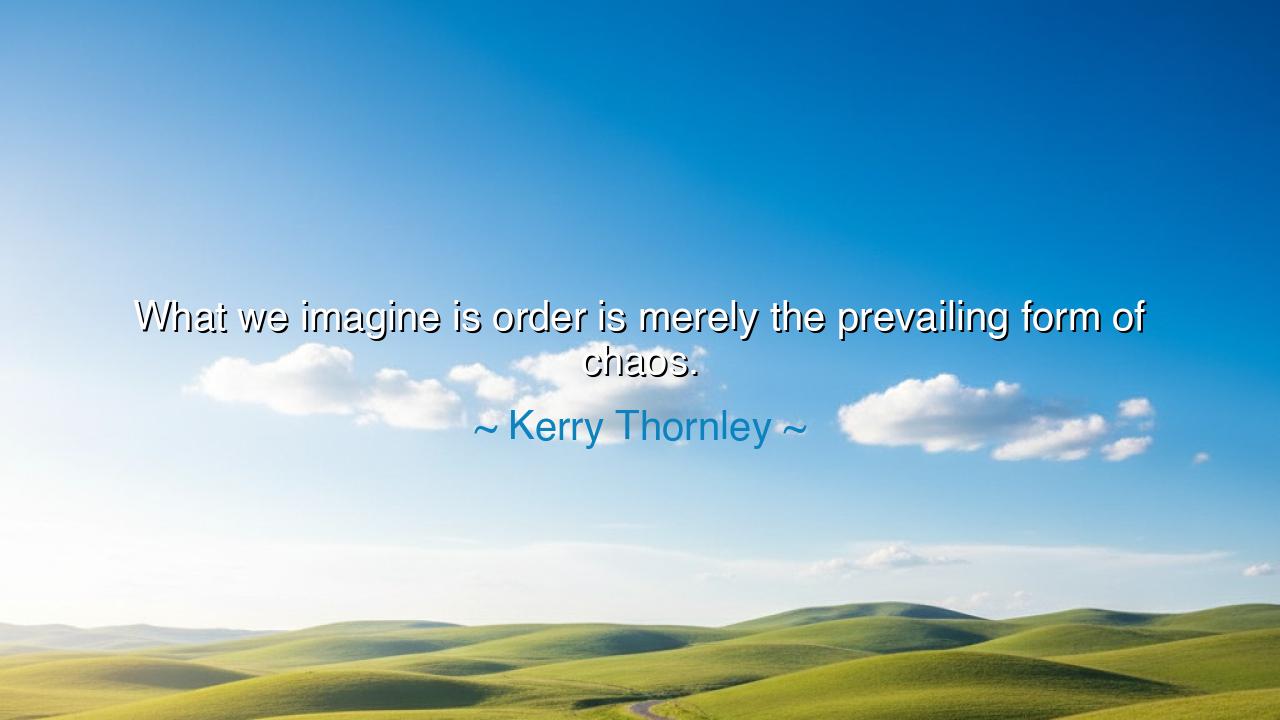
What we imagine is order is merely the prevailing form of chaos.






"What we imagine is order is merely the prevailing form of chaos." Thus spoke Kerry Thornley, the trickster-philosopher and co-founder of Discordianism—a creed of paradox that worships not control, but the divine dance of disorder. Beneath his wit lies a truth ancient and eternal: that what we call order is not the defeat of chaos, but its fleeting mask. The world, he reminds us, is never fixed—it is a vast and shifting sea where harmony and disruption endlessly trade places. To believe in permanent order is to live in illusion; to see the hidden balance within chaos is to awaken to reality.
In the beginning, say the old philosophers, there was Chaos, the primal mother of existence. From her womb came the heavens, the earth, and all that breathes. Order was not born apart from her, but within her. Even the stars, which seem fixed in divine symmetry, are but storms of fire spinning in emptiness. Thornley’s words echo this ancient vision: the cosmos itself—our word for “order”—is still chaos in motion, momentarily arranged in patterns our fragile minds mistake for permanence. What we call stability is but the calm between tempests, the rhythm between one collapse and the next.
Consider the rise and fall of empires. The Romans, in their glory, believed they had brought eternal order to the world. Their laws reached across continents, their roads stitched the earth together, their legions silenced rebellion. Yet even as they built monuments to permanence, decay had already begun. Corruption crept into the Senate, greed devoured the cities, and chaos—patient, unseen—waited for its hour. When Rome fell, it was not destruction, but transformation; the chaos that seemed to end an age became the soil for new beginnings. So it has been with every human order—from Babylon to Byzantium, from monarchs to machines. The chaos we fear is not our enemy; it is the seedbed of creation.
Thornley himself, the jester among philosophers, sought to remind a world obsessed with systems and structure that disorder is divine. Living in the shadow of the Cold War, when nations clung to rigid ideologies and absolute truths, he saw how the human hunger for control breeds tyranny. His Discordian philosophy declared that chaos and order are not opposites, but partners in the eternal dance. The one gives birth to the other, as night gives meaning to day. To embrace this is to find peace amidst uncertainty, laughter amidst fear, and freedom amidst the illusions of control.
Science itself now confirms what ancient mystics and tricksters once whispered. Beneath the seeming regularity of nature lies chaotic complexity—from the flutter of a butterfly’s wings shaping the path of a storm, to the hidden turbulence in the motion of galaxies. The patterns we see are not imposed upon the universe; they are the momentary expressions of its chaos. What Thornley understood—and what the wise have always known—is that chaos is not destruction, but vitality. It is the heartbeat of existence, the unending change that gives birth to new forms. Without it, there would be no growth, no creation, no life.
To live wisely, then, is not to fear chaos but to walk in harmony with it. The wise man does not seek to imprison the world in his definitions, nor to fix life in unchanging patterns. He accepts that his plans may crumble, his beliefs may shift, and his certainties may dissolve—and still, he remains at peace. For he knows that what he calls “order” is but a moment’s triumph in an endless dance. When change comes, he welcomes it as a friend returning in a different guise. He does not curse the storm; he learns to sail with it.
So, my children of reason and wonder, take this teaching into your hearts: the world is not meant to be controlled—it is meant to be understood and embraced. The chaos that surrounds you is not a punishment, but a teacher. When your plans fall apart, when your certainties vanish, when your world changes faster than you can grasp, remember Thornley’s truth: this, too, is the order of the moment. Tomorrow will bring another.
Therefore, live not as prisoners of order, nor as slaves to chaos, but as dancers upon the edge of both. Laugh at the illusions of permanence, and find beauty in the flux. Let your imagination be vast enough to hold both harmony and discord, both creation and decay. For what we imagine is order is only the prevailing form of chaos, and to see that clearly—to love that truth—is to stand at the very heart of the universe’s mystery.






AAdministratorAdministrator
Welcome, honored guests. Please leave a comment, we will respond soon